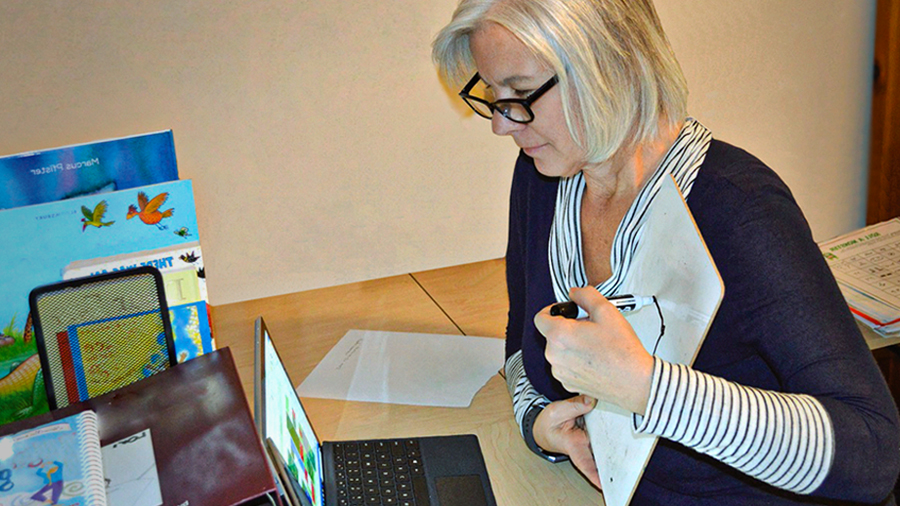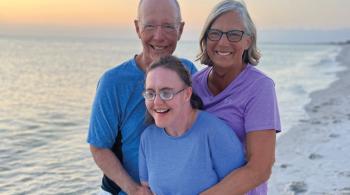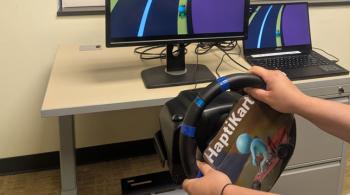By Laura Thornton

As states and countries embraced stay-at-home orders this past spring to “flatten the curve” of the COVID-19 pandemic, medical providers around the world turned to telehealth to provide ongoing care to patients in need of their services. For many providers, this was a new approach to medical care.
But this approach wasn’t new at Kennedy Krieger Institute, where several programs have been offering telehealth to patients for years. Telehealth uses video technology to deliver healthcare, and it includes telemedicine (providing medical services), teletherapy (providing physical, occupational, speech-language, behavioral and other therapies), and tele-education for medical training.
For the past three years, Kennedy Krieger’s Behavioral Health Program for Military Families, directed by Dr. Jennifer Crockett, has offered telehealth appointments for Maryland families connected with the military. At the start of the pandemic, the program’s telehealth model was quickly adapted by programs, clinics, departments and centers across the Institute. For families without a computer, tablet or smartphone, Kennedy Krieger has loaned tablets and other equipment to them or is conducting appointments over the telephone.
“Within days, our Telehealth Task Force team, comprised of telehealth leads from across the Institute, had completely transformed our service delivery model,” says Dr. Crockett, who co-directs the team and is a psychologist for Kennedy Krieger’s Department of Behavioral Psychology, which offers services for military families.
Within days, our Telehealth Task Force team … had completely transformed our service delivery model.”
– Dr. Jennifer Crockett, Telehealth Task Force team co-director, psychologist for Kennedy Krieger’s Department of Behavioral Psychology, and director of the Institute’s Behavioral Health Program for Military Families
Telehealth’s growth at Kennedy Krieger was swift: The week of March 9, Kennedy Krieger conducted 4,773 in-person appointments and 12 telehealth appointments. One month later, weekly telehealth appointments numbered more than 5,000, while in-person appointments were not quite 300. Since then, in-person services have increased, while telehealth services have remained high: In the last week of July, Kennedy Krieger conducted 4,587 telehealth appointments and 534 in-person appointments.
“It’s a whole new treatment model, and we coalesced around it in just a couple of weeks,” says Dr. Deepa Menon, assistant medical director for the Institute’s Center for Autism and Related Disorders (CARD), which offered occasional telehealth appointments before the pandemic. “I’d always wanted to expand telehealth to other fields, to decrease health disparities among patients who cannot easily visit us in person,” says Dr. Menon, who’s been conducting neurodevelopmental consultations via telehealth with families in rural Maryland since 2014.
“We’d been talking about it for many years, and this was the opportune time to try it out on a larger scale.” What makes it work, Dr. Menon says, is that “we keep patients and families in the center of all we do.” Kennedy Krieger’s goal during the pandemic—and beyond—is that every child and family who need its expertise will be able to access it. Telehealth and patient-centered care make that goal achievable.
With telehealth, a patient’s home environment and family play an important role in an appointment. “Seeing children in their natural environment is really helpful—it’s not artificial, and it’s more comfortable for them. We providers get to see a lot of what their parents want us to see,” Dr. Menon says.
“It also empowers parents,” she adds. Because parents are taking a greater part in their child’s evaluation or therapy than they would for in-person appointments, they are often learning more quickly how to play and connect with their child—important breakthroughs for parents of children with conditions such as autism spectrum disorder. “It’s a very nice thing to see,” Dr. Menon says.
“We have had to find new ways to get patient information and to evaluate a child,” adds Dr. Paul Lipkin, the Institute’s director of medical outpatient services. “But at the same time, we’ve also developed a more personal experience with families, as we ‘enter’ their home and have a personal conversation with them regarding their adjustments during this difficult time.”
One of the challenges of providing medical care to Kennedy Krieger’s patients and students via telehealth is the interdisciplinary nature of that care.
The Institute’s Infant Neurodevelopment Center, for example, takes a team approach in evaluating infants and children with perinatal brain injuries. The center developed a virtual conference room model, in which different “exam rooms” on Zoom, a videoconferencing platform, are organized through a virtual “conference room.” This allows team members to perform a virtual, interdisciplinary evaluation of a patient and have a place to discuss the evaluation in real time, explains developmental neurologist Dr. Joanna Burton, a co-director of the center.
“We’ve found that because we are talking parents through the evaluations rather than doing the evaluations ourselves, the appointments are taking a bit longer—90 minutes rather than an hour,” Dr. Burton says. “The parents have been totally unbelievable, taking on the roles of parents, videographers, and honorary therapists and neurologists as they ‘do’ the assessments, and our team has done an amazing job of guiding them through maneuvers.”
We have had to find new ways to get patient information and to evaluate a child. But at the same time, we’ve also developed a more personal experience with families, as we ‘enter’ their home and have a personal conversation with them regarding their adjustments during this difficult time.”
– Dr. Paul Lipkin, Kennedy Krieger’s director of medical outpatient services
Initially, Dr. Burton and her colleagues didn’t think they would be able to make definitive diagnoses during telehealth appointments, “particularly related to cerebral palsy, because we were not touching the children to assess tone. But on the first day of telehealth, we broke that rule, with three cerebral palsy diagnoses,” she says.
“The spirit behind early diagnosis is letting families know what we know when we know it. If there’s an intervention that allows children better functioning, we need to make sure they get it,” Dr. Burton explains. “On that first day of telehealth, as parents evaluated their child’s range of motion, you could see in their faces as they recognized asymmetries in their child’s muscle tone. It would have done them a disservice not to confirm the diagnosis.”
Another challenge to switching to telehealth appointments has been that not everyone has the necessary technology. The Telehealth Task Force team surveyed Kennedy Krieger employees to determine what additional technologies would be needed, and the Institute received a $995,000 grant from the Federal Communications Commission (FCC), as part of the Coronavirus Aid, Relief, and Economic Security (CARES) Act, to provide technological equipment to families in need.
With the pandemic still affecting our typical way of life, Kennedy Krieger providers expect to be using telehealth for some time to ensure their patients receive the care and services they need. Thanks to their dedication to serving families, their out-of-the-box thinking, and their willingness to try new ways of delivering healthcare, Kennedy Krieger’s patients and students will continue to grow and heal.















